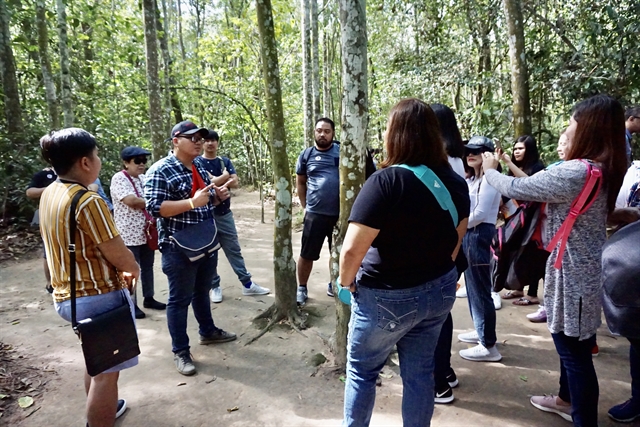 Society
Society

To maintain robust growth, the tourism and hospitality sector must improve the quality of its employees through better training programmes and school-industry partnerships, experts have said.

|
| A tour guide explains the history of Củ Chi Tunnels to foreign tourists. VNS Photo Thu Hằng |
Thu Hằng
HCM CITY — To maintain robust growth, the tourism and hospitality sector must improve the quality of its employees through school-industry partnerships and better training programmes, experts have said.
By 2025, the sector aims to contribute 10 per cent of the country’s gross domestic product (GDP) and generate income for six million people, but to reach the target, it needs nearly 40,000 additional employees each year.
About 15,000 students from tourism and hospitality schools graduate each year, with university and college students accounting for only 12 per cent.
There are currently 1.3 million employees working in the tourism and hospitality sector nationwide, with only 42 per cent of them trained in tourism.
The number of tourism staff needed by 2020 is expected to be 870,000, according to the Government’s Strategy for Tourism Development to 2020, with a vision to 2030.
Trần Anh Tuấn, director of the Institute for Tourism Development Research, said that a skilled workforce in tourism, which is a main driver of economic growth in the country, is needed for repeat visits and greater customer satisfaction.
Tourism staff should be able to use advanced information technology and have practical skills to serve customers who are increasingly global and demanding, he added.
Skills council
Trương Anh Dũng, deputy director general of the Directorate of Vocational Education and Training under the Ministry of Labour, Invalids and Social Affairs, said the tourism sector should provide more accurate job forecasts and develop a long-term plan for tourism and hospitality training at schools and centres.
Partnerships in training should also be promoted between local and foreign schools, he said, adding that businesses should cooperate with schools to provide real-world internships to students.
Training of tourism human resources should be based on the actual needs of enterprises, he added.
The Directorate plans to establish a skills council composed of leading experts from State agencies, schools and enterprises to give advice to the Government and enterprises on workforce development and needed skills.
Under the assistance of the Australian Government, Việt Nam will adapt a similar council model used in Australia, he said.
Dr Cheah Kuan Yean, general director of Becamex Hospitality in Bình Dương Province, said that schools must be aware of industry trends so that education programmes can be customised and updated to develop the full potential of students.
“Internships and work that integrates learning are the best tools to engage students with their chosen career environment,” Yean said. “This is not just an opportunity to be in a practical work situation, but is also an excellent time for students to find out if the work should be their career choice."
“Academia is part of the labour supply for industry partners, and from this perspective, we need to be connected," he added.
As the hospitality industry is strongly involved with the global market and English is a global language used in commerce, it is imperative to have English as the priority communication vehicle to address and deliver guest satisfaction, according to Yean.
To provide and maintain service product quality, it is important for staff to communicate in foreign languages so that guests feel welcomed and served, he said.
Courses in Japanese, Korean, Mandarin, French and others are now being offered at schools so that students can work in the global marketplace.
“We also need to look at the qualification of the hospitality lecturers in the university,” Yean said. “Lecturers should have as much industry experience as possible and be engaged in hospitality operations and practices, and not just have academic excellence."
Work-integrated learning
Dr Jackie Ong, discipline lead for the Tourism and Hospitality Management programme at RMIT Vietnam, said that preparing students for the workplace is a top priority for RMIT University Vietnam.
“Work-integrated learning approaches enable students to anticipate and solve industry related problems in their projects and assignment," she said. “The school collaborates with industry to share their best practices and mentoring with our students. Our final-year students are attached to industry for internships to help them be ‘job ready’ before they graduate.”
Students learn how to conduct themselves in the business world and make connections that may lead to future employment.
To enhance cooperation between schools and industry partners, it is important that both partners have shared goals and make commitments under a Memorandum of Understanding, as well as have regular communication between partners, she said.
This pattern of cooperation is reinforced with a more detailed Standard Operational Procedure (SOP) agreed to by both parties, Ong added.
RMIT has established strong partnerships with local and overseas industry partners, including the InterContinental Hotel Group, Sheraton Hotel, JW Marriott Hotel, Hilton Hotel, Q Industries, Alma Group Vietnam, and Buffalo Tours Vietnam.
It also incorporates industry partners’ best practices into the school curriculum and invites industry leaders to the classroom to give lectures.
New tourism record
The tourism sector this year set a new record by welcoming nearly 1.62 million foreign tourists in October, up 34.3 per cent year-on-year.
Việt Nam was listed among the top 10 destinations for international arrivals in the Asia-Pacific region, according to the latest quarterly report released by the Pacific Asia Tourism Association (PATA).
Việt Nam passed Indonesia to rank fourth in Southeast Asia after Thailand, Malaysia and Singapore. PATA’s statistics for the first six months of the year were based on the number of foreign visitors to 35 destinations in the Asia-Pacific region.
The tourism industry contributes 8.4 per cent of GDP, according to the Việt Nam National Administration of Tourism. — VNS

|
| An F& B worker at a five-star hotel in HCM City. VNS Photo Thu Hằng |




